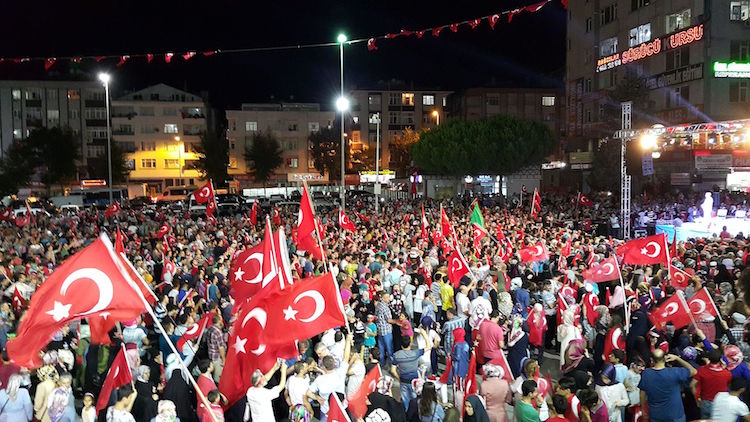
Analysis by Vice Admiral Anil Chopra*
The attempted coup on July 15 in Turkey as well as its aftermath have irreparably dented President Erdogan’s international image and impacted Turkey’s standing as a democratic state, a military power, a NATO member, an EU aspirant, and an emerging economy. This downtrend is unlikely to be reversed in the near future and the country is in for an extended period of instability
MUMBAI (IDN-INPS | Gateway House) – There has been, and continues to be, much speculation about whether the attempted coup in Turkey was staged by President Recip Erdogan himself; about him orchestrating it in order to identify and eliminate his enemies, both Kemalists and Gulenists – as the millions of moderate and pro-western followers of the U.S.-based cleric, Fethullah Gulen, are now referred to. Parallels are even being drawn with Adolf Hitler’s purges after the staged Reichstag fire in 1933.
In balance, however, the July 15 coup appears to have been poorly planned and executed by a cliqué within the armed forces, which did not have the support of either the opposition parties or of the public, and not even larger military backing. It failed because of the inability of the leaders to control the media and shape the narrative, as well as to neutralise Erdogan himself.
Luck may have played a part too. The president narrowly escaped both the bombing of the hotel he was holidaying in, and the shooting down of his aircraft after it was intercepted during a flight to Istanbul from the resort town of Marmaris, due to the yet unexplained reluctance of the F 16 pilots who had him in their sights.
However, more than any other factor, the coup was defeated by the mobs of the president’s supporters taking to the streets after being roused by the muezzins from the mosques, and by Erdogan himself through innovative use of social media.
Be it a ‘staged‘ coup or a ‘failed’ coup, the aftermath has definitely been a ‘counter-coup’, with the arrest of over 60,000 people from all walks of life, including journalists and teachers, but centered on the armed forces. It has led some commentators to term these after effects a ‘civil ‘coup against the military.
The declaration of a state of Emergency allows the president to assume sweeping extra-constitutional and extra-judicial powers, which Erdogan has already used not only to purge individuals, but also to shut down private schools, NGOs and a host of associations and foundations.
The president’s actions after the attempted coup may have well achieved what the coup leaders could not – they have irreparably dented Erdogan’s international image and underlined his authoritarian and undemocratic mind-set.
Despite the support of the Islamists and the mobs, such international opprobrium, in combination with renewed opposition from large alienated sections of Turkish society within the country, almost certainly point to the beginning of the end for Erdogan. The question only remains as to how long the present ferment will last, though it does appear that Turkey is in for an extended period of instability.
Even failed coups have strategic implications. The events in Turkey are clearly bad news for the region as a whole, and for the ongoing struggles against the ISIS in Syria and Iraq, though air operations from the NATO base at Incirlik in Anatolia are unlikely to be affected in the foreseeable future.
It is also bad news for the energy flows from the Caspian rim to developing Eastern Europe, and consequently for the prosperity and stability of the Balkans in their entirety. However, more specifically, how will the events in Turkey impact the U.S., the European Union, Russia, Israel, and the Kurds, who are the principal stakeholders in the region?
Ever since World War II, Turkey has been vital for the U.S., first as a bulwark against the Soviet Union, and then against Islamic radicalism. It is unlikely that the U.S., whilst ignoring demands for the extradition of Gulen, will take any covert action against Erdogan until it completes operations against the geographical holdings of the ISIS, and certainly not before the U.S. elections, thus giving the Turkish president time to purge and consolidate power.
However, the road that Erdogan is taking would hardly be in the long term interests of the U.S., and therefore America will eventually pressure him to moderate or else it will work actively to replace him.
While probably continuing to remain a member of NATO, Turkey’s chances of now gaining membership to the EU have considerably reduced, especially given the turmoil of Brexit, and Erdogan’s stated intention of reintroducing the death penalty.
More critically, the refugee deal with the EU, whereby Ankara agreed to house millions of Syrian refugees in exchange for the lifting of visa requirements for Turkish citizens in the Schengen area, may now be threatened, with severe repercussions for the refugee crisis in Europe.
The EU is however still likely to exert both moral and economic pressure to try and rein in excesses, and add to the chorus against the Turkish strongman, while keeping hopes of EU membership alive.
In recent times, by offering a belated apology in June 2016 for the downing of the Russian jet in November 2015, Erdogan has mended strained ties and built bridges with President Vladimir Putin.
The Russian media is already claiming that Moscow provided the warnings about the impending coup, and it does appear that both Putin and Erdogan would stand to gain by moving closer.
By doing so, Ankara will have a bargaining chip with the U.S./NATO across the board, and more so to offset the U.S.’s support to the Kurds. It would certainly help Putin’s continued search for relevance, through the destabilisation of a fractured Europe, and the move towards a Eurasian Economic Community.
Similarly, Tel Aviv entered into a reconciliation deal with Ankara in June, whereby Israel will allow Turkish humanitarian aid for Gaza, while maintaining its blockade, with the primary objective of enhancing regional stability through detente with a relatively reasonable Muslim state.
The Kurds are opponents of both Erdogan and the army, and look more to the U.S., NATO, and even Russia to further their cause. They are likely to refrain from exploiting the immediate situation.
Of course, the most severe impact will be felt by the Turkish people and Turkish institutions. The morale and fighting efficiency of the armed forces are bound to have been hugely affected, as also the functioning of the police and the judiciary.
The ability of these agencies to coordinate and conduct operations against the Islamic State or the Kurds will now be now suspect, given the inherent internecine suspicions generated by the coup.
Clearly, Turkey’s standing as a democratic state, a military power, a NATO member, an EU aspirant, and an emerging economy, have all taken a beating. It is highly unlikely that this downtrend will be reversed in the near future.
* Vice Admiral Anil Chopra is Distinguished Fellow, International Security and Maritime Studies, Gateway House. He was the former Commander- in-Chief of the Western Naval Command, the Eastern Naval Command, and former Chief of the Indian Coast Guard. This article was first published by Gateway House: Indian Council on Global Relations. You can read the original article here.” (IDN-INPS | 29 July 2016)
Related article: Behind Turkey’s Failed Coup and its Puzzling Aftermath
http://www.indepthnews.net/index.php/sustainability/peace-justice/549-behind-turkey-s-failed-coup-and-its-puzzling-aftermath
Photo: Anti-coup protesters after 15 July 2016 Turkish coup d’état attempt in Bağcılar, İstanbul, Turkey. Credit: Wikimedia Commons.

